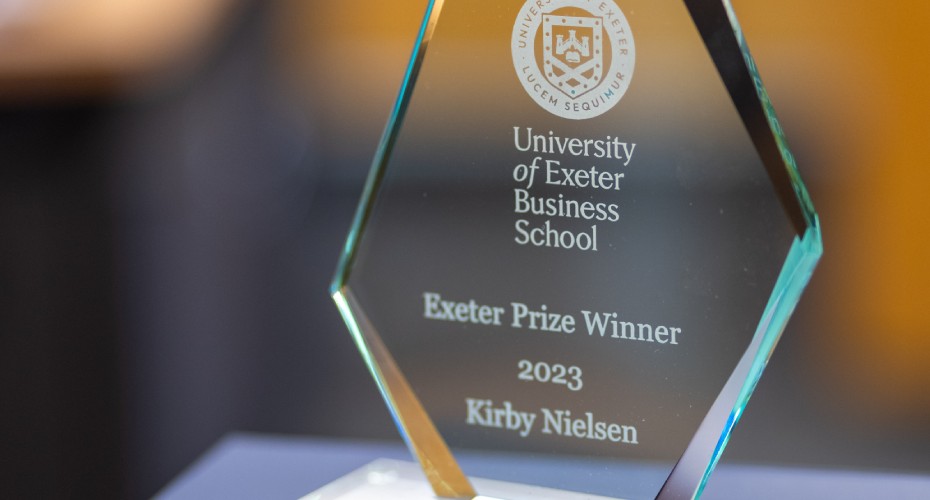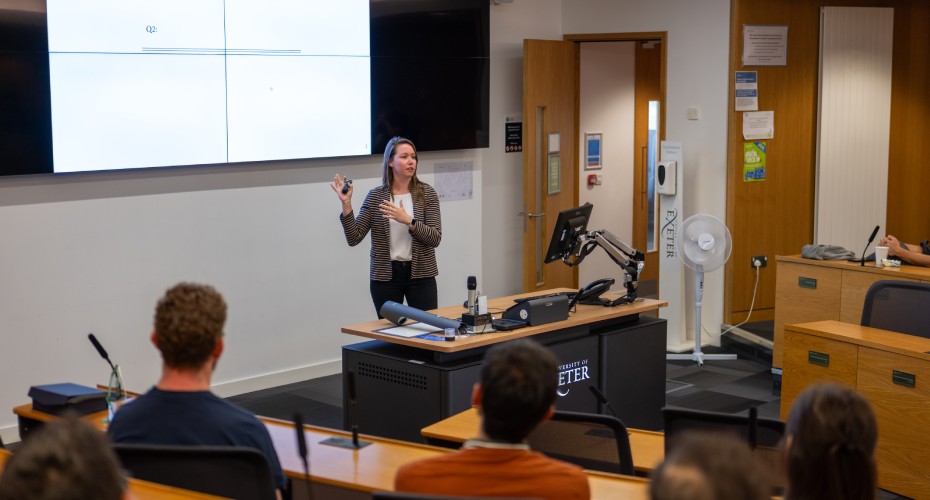EXETER AWARD GIVEN TO KIRBY C. NIELSEN
Exeter Prize 2023 Winners
We are happy to announce the winners of the 2023 Exeter Prize for the best paper published in the previous calendar year in a peer-reviewed journal in the fields of Experimental Economics, Behavioural Economics and Decision Theory.
The winners are Kirby (Kempe) Nielsen (Caltech) and John Rehbeck (Ohio State University) for their paper “When choices are mistakes”, published in The American Economic Review.

Kirby Nielsen being presented the Exeter Prize 2023 by Professor Loukas Balafoutas
The paper addresses fundamental aspects of rationality in economic theory. Do people accept the axioms of rational choice? Are violations of these axioms intentional or mistaken? And how do people respond if they discover that their choices violate the axioms? The research answers these questions with a number of clever empirical innovations.
In the study, participants in the laboratory were presented with six axioms, such as the independence of irrelevant alternatives (IIA) or transitivity, and were provided with clear and simple explanations of each axiom. For each axiom, participants were given a choice of whether to make incentivized choices themselves or have the axiom automatically applied on their behalf, saving time and effort. To account for experimenter-demand effects, a set of control axioms that reversed the standard axioms was included in the research. The findings show that participants endorsed the standard axioms roughly 80% of the time, indicating that people do accept these axioms. By contrast, participants rarely endorsed the c-axioms (10% of the time). Next, the authors explore how participants dealt with conflicts between accepted axioms and their own choices. 47% of participants resolved contradictions by changing their choices, indicating a desire to conform to the axioms; 13% withdrew their endorsement of the axiom; and 37% chose to live with the contradiction. On the other hand, only 20% of participants resolved a contraction with “c-axioms” by changing their choice, and 35% withdrew their endorsement of the c-axiom. This suggests that participants were much more inclined to view violations of rationality axioms as mistakes.
The paper presents a range of intriguing findings, including variation across axioms in how contradictions were resolved. For instance, violations of IIA led participants to revise their lottery choices 78% of the time, whereas violations of stochastic dominance led them to revise lottery choices just 29% of the time. The behavioral literature founded by Kahneman and Tversky often demonstrates violations of basic axioms, which raises the question of whether the definitions of rationality ought to be changed to align with actual behavior. This research shows that when the standard axioms are explained clearly, and violations are demonstrated clearly, people do in fact endorse the axioms. In conclusion, this research offers a distinctive and valuable empirical contribution to the continuing theoretical debate surrounding rationality.
The winning paper was selected by the panel of Erik Eyster (UC Santa Barbara), Rick Larrick (Duke University), and Muriel Niederle (Stanford University).
.jpg)


